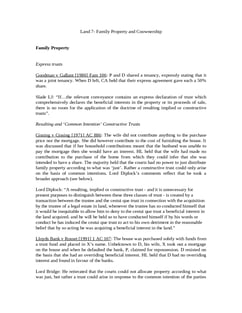Fairclough v Swan Brewery [1912] AC 565
Judgement for the case Fairclough v Swan Brewery
KEY POINTS
A mortgage cannot be made irredeemable, and equity will not allow any scheme or device to obstruct or delay redemption, whether it was implemented before or after the mortgage transaction.
While restrictive covenants in commercial contracts are not automatically void, they should not be more extensive than necessary to protect the legitimate interests of the party seeking enforcement.
FACTS
The appellant purchased a hotel in December 1907 from a vendor who held the property under a lease. The annual rent for the lease was £520, and there was an outstanding mortgage of £1500 held by the respondents. The respondents refused to be paid off and insisted that £500 should remain to cover a covenant related to the hotel.
On December 27, 1907, the appellant executed a mortgage for £500, which included the mentioned covenant. As a result, the respondents refused to allow redemption except through monthly instalments specified in the mortgage deed.
In June 1910, the respondents sued the appellant to recover damages for breaching a covenant in the mortgage deed, which required the appellant to purchase ale, beer, and stout from them. The appellant, in his defence, argued that the covenant was an unreasonable restraint of trade, contrary to public policy, and only binding during the mortgage's continuance. He also counterclaimed against the respondents for damages related to their breach of covenant to supply him with ale, beer, and stout.
The central issue in this case was whether the restrictive covenant preventing Fairclough from purchasing alcoholic beverages from sources other than Swan Brewery was legally enforceable.
JUDGEMENT
The court ruled in favour of the appellant, stating that it is entitled to redeem the mortgage.
COMMENTARY
This case has had a lasting impact on contract law, particularly in the context of commercial agreements. It serves as a precedent for courts to assess the reasonableness of restrictive covenants, ensuring that they do not unduly stifle competition or trade.
ORIGINAL ANALYSIS
Plaintiff bought a property from X who had given a mortgage to Defendant. The mortgage had included a term stating that it could not be paid off (and hence the interest redeemed) until the last six weeks of the 21 year lease.
HL held that this contradicted the requirement of redeemability of the mortgage.
Lord Macnaghton
Equity will not permit any device or contrivance being part of the mortgage transaction or contemporaneous with it to prevent or impede redemption.
RELATED CASES
For Further Study on Fairclough v Swan Brewery
Need instant answers? Our AI exam tutor is here to help.
Ask questions 🙋 Get answers 📔 It's simple 👁️👄👁️
Our AI is educated by the highest scoring students across all subjects and schools. Join hundreds of your peers today.
Get StartedSimilar Cases
Related Product Samples
These product samples contain the same concepts we cover in this case.
| Land Law | Leases Notes (77 pages) |

